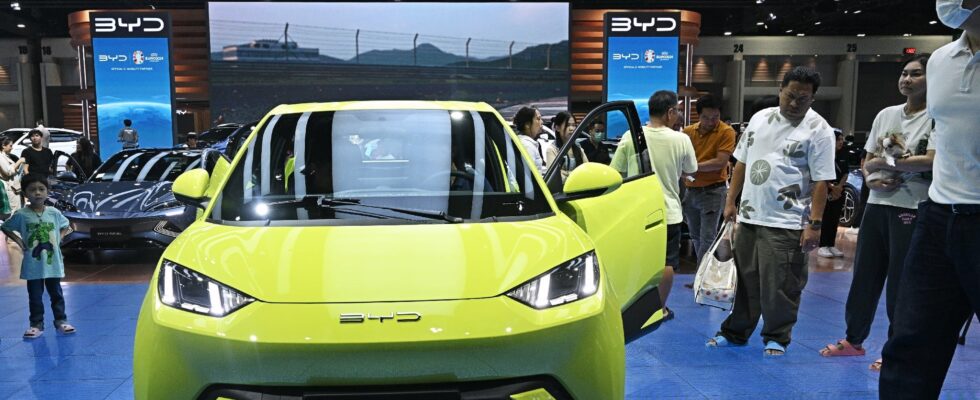China indicated this Wednesday, October 30, that it had referred the matter to the World Trade Organization (WTO) after the decision deemed “protectionist” by the European Union (EU) to impose customs surcharges on electric cars imported from the Asian country. The European Commission adopted on Tuesday the regulation establishing these additional customs duties against these vehicles, which it accuses of creating unfair competition. Despite Germany’s hostility, Brussels has decided to add to the 10% tax already in place a surcharge of up to 35% on Chinese-made battery cars. The decision, which applies for five years, was published on Tuesday evening in the Official Journal of the EU and is due to come into force on Wednesday.
“China does not approve or accept this decision. It has initiated action under the dispute settlement mechanism of the World Trade Organization (WTO),” a ministry spokesperson said on Wednesday. Chinese Commerce in a press release. “China will continue to take all necessary measures to firmly safeguard the legitimate rights and interests of Chinese companies,” he stressed, denouncing the EU’s “protectionist approach”.
The EU’s stated objective is to re-establish fair conditions of competition with manufacturers that it accuses of benefiting from Chinese public subsidies. This involves defending the European automotive industry and its approximately 14 million jobs against practices deemed unfair by a long Commission investigation.
More than 14% market share
The market share of Chinese electric cars has exploded in the EU, from less than 2% in 2020 to more than 14% in the second quarter of this year, according to figures from the EU executive. “We value competition but it must be based on fair competition rules,” said Trade Commissioner Valdis Dombrovskis, describing the European measures as “proportionate” and “targeted”.
Until the last moment, Valdis Dombrovskis spoke with the Chinese Minister of Commerce Wang Wentao, to try to find a negotiated solution. In vain. The two parties, however, agreed to continue consultations: the surcharges could be removed if an agreement was found on other means to compensate for the damage identified by the European investigation. “China has always advocated resolving trade disputes through dialogue and consultation,” the Chinese Ministry of Commerce said on Wednesday. “We hope that the EU will work with China constructively, follow the principles of pragmatism and balance, take into account each other’s main concerns, so as to reach a solution as soon as possible.”
China had threatened to strike European interests. It has already responded by launching anti-dumping investigations targeting pork, dairy products and wine-based spirits imported from Europe, including cognac. Germany and four other countries (Hungary, Slovakia, Slovenia, Malta) voted against the Commission’s tax plan, failing to muster the majority needed to reject it. The EU is taking the risk of triggering a “trade conflict”, reacted the German automobile lobby (VDA). The country’s automotive flagships, strongly established in China, the world’s largest market, fear paying the price.
A “politically motivated” decision according to Beijing
The surcharges had received the support of ten member states including France, Italy and Poland. Twelve others abstained, including Spain and Sweden. “The European Union is taking a crucial decision for the protection and defense of our commercial interests,” welcomed the French Minister of the Economy, Antoine Armand. But, in France too, the EU’s approach worries economic circles. The Cognac inter-professional association (BNIC) complained of being “abandoned”, believing that its sector was “sacrificed” in a commercial conflict which does not concern it.
The Chinese Chamber of Commerce to the EU (CCCEU), which represents Chinese companies in Europe, condemned the decision on Tuesday, which it described as “politically motivated”. This Sino-European skirmish is part of a broader context of commercial tensions between the West, led by Washington, and China, which they accuse of anti-competitive practices in several sectors such as wind turbines or solar panels.
In Europe, the amount of surcharges will vary between manufacturers depending on the estimated level of subsidies received. In detail, additional taxes will amount to 7.8% for Tesla cars manufactured in Shanghai, 17% for BYD, 18.8% for Geely and 35.3% for SAIC, according to a document sent to member countries on September 27. Other groups that cooperated in the European investigation will be subject to 20.7% surcharges, compared to 35.3% for those that did not cooperate.
